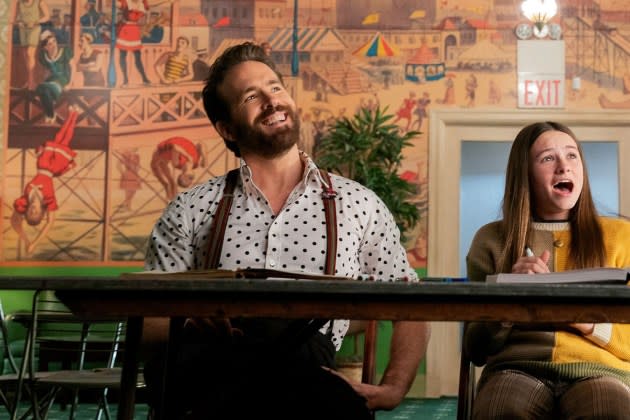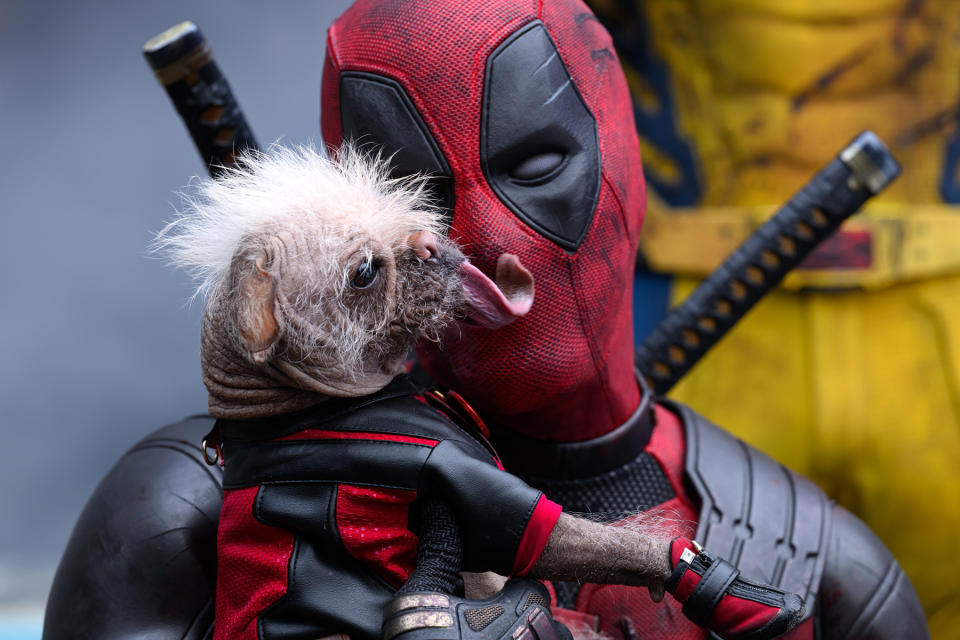We Have Reached Peak Ryan Reynolds, Movie Star and 21st Century Celebrity
- Oops!Something went wrong.Please try again later.
- Oops!Something went wrong.Please try again later.

Withering exasperation is not an emotion one usually expects to encounter at great length in a family film. But what else could John Krasinski have been seeking when he secured Ryan Reynolds to star as a sad clown in his mawkish new live-action fairy tale, IF? Reynolds plays Cal, a New York City lump who’s saddled himself with the responsibility of looking after a cavalry of imaginary friends, a.k.a. fanciful cartoon critters forgotten by the children who dreamt them into existence. His handsome face swallowed by hangover stubble, his famous abs concealed under a white T and suspenders, the actor slumps through the movie with an all-too-convincing air of begrudged participation. With no real jokes to tell, his signature sarcasm wilts like a dying flower.
It’s possible to, well, imagine someone else in this particular role — to see it going to an actor with a more soulful hangdog quality or at least a more kid-friendly weariness. But that would also require imagining a world where Ryan Reynolds wasn’t effectively in everything. IF might be the clearest proof yet that we’ve reached a peak saturation point for the Canadian funnyman with the model physique and the arch gag-machine delivery. Apparently all-in on Reynolds, Hollywood is now reasoning that his star power — some chemically adhesive combination of dashing leading man, comic-relief cutup, and lifestyle mogul — will prove irresistible regardless of the context.
More from Rolling Stone
Travis Kelce Was 'Shocked' Ryan Murphy Gave Him Role in 'Grotesquerie'
Gracie Abrams' New Album Features Taylor Swift Collaboration
In an increasingly decentered pop-culture world, Reynolds is practically ubiquitous, a one-man monoculture. You can barely glance at a screen without catching a glimpse of his pearly jackal’s grin. As far as projects go, the guy doesn’t demographically discriminate: This summer, he’ll chase the PG-rated warm and fuzzies of IF with the R-rated irreverence of another Deadpool sequel. While his pinup-boy elder Tom Cruise commits religiously to the movie-theater experience, Reynolds hedges his bets, alternating big-screen blockbusters with disposable streaming fare like Spirited and Red Notice that keeps his beaming mug in constant rotation. He’s not above lending his stardom for a quick cameo appearance, either; see Ghosted and Bullet Train, if the algorithm hasn’t served them to you already.
Like his good friend Taylor Swift, Reynolds has arguably pushed past mere celebrity to the higher status of 21st-century brand. Movie stars have always traded on their visibility and fame, carefully crafting an image of themselves that can be bought, sold, and meaningfully subverted by the right filmmaker. But Reynolds has made the entrepreneurial aspect of movie stardom more explicit by rolling his whole acting career into a larger portfolio of business ventures. He hasn’t just invested in luxury alcohol, wireless phone networks, and advertising firms. He’s also made himself the slick, self-deprecating public face of those companies. In that respect, he’s truly a movie star for the influencer age, a tireless king of content.
There was a time when it would have been hard to picture Reynolds ruling the Hollywood roost. His Gen X snarkiness, honed on the ABC sitcom Two Guys and a Girl then refined in broad studio comedies, rocketed him to fame while also putting a certain distance between him and a prospective audience. He always seemed to be surveying every moment from a sardonic remove — a schtick that could come across as smug. And his more animated comic performances seemed to answer a question no one was asking: What if Jim Carrey was a frat-house hunk? He had the good looks of a marquee superstar, but maybe not the sensibility. It’s no great shock that some of his earlier forays into romantic- and action-comedy didn’t spark, nor that his rise to the A-list stalled during the earnestly optimistic 2000s.
But the culture eventually bent in Reynolds’ direction. Or maybe he just located some savvier middle ground between irony and sincerity. It was Deadpool, a superhero passion project he chased for years, that finally revealed a talent for self-parody. Turning that snark around on himself — and on the very movie he was starring in — seemed to open up some larger postmodern appeal of Ryan Reynolds. He was a movie star not afraid to make fun of himself or his flops. And maybe slathering his famous face in prosthetic burn tissue made him more approachable, more sympathetic.
Few movie stars have ever seemed more in touch with the spirit of social media. Reynolds, especially in full Deadpool regalia, often seems to be channeling the voice of Reddit’s less hostile corners. He’s like a memelord Adonis, putting a flatteringly handsome visage on a whole message-board culture of referential jokes. You could even call the meta humor of the Deadpool movies a coded form of internet speak: Staring past the fourth wall, he performs his own TikTok movie commentary, opening a deceptively parasocial window into his stardom via every candid gag discussion with the audience. Can your failures even stick when you’ve turned clowning on them yourself into an essential aspect of your star persona?

There’s some range beneath the cheeky showmanship that’s come to define the public image of Ryan Reynolds. Cynicism is the toggle he’ll toy with most in his blockbusters: If Wade Wilson takes his self-awareness to one extreme, the gee-whiz naivete of Free Guy sits at the other end. Outside the Hollywood content mill, he’s pushed himself further, playing a terrified soldier in Buried, an obsessively searching father in The Captive, and a cheerfully insane killer in The Voices. The underrated Definitely Maybe unlocked a wounded romanticism he rarely exhibits. And his best performance to date remains his turn as a slick gambler in Mississippi Grind, which unfiltered his charisma, purifying it through the naturalism of modern-day New Hollywood-style character drama.
These days, though, Reynolds isn’t taking a lot of risks with his success. Post-Deadpool, he’s committed himself mostly to the brand of Ryan Reynolds: a bulletproof quipster hunk routine that can be slotted with minimal variation into major-studio and Netflix distractions alike. There’s something ephemeral about a Reynolds performance in 2024. He usually has one foot planted in the material and one planted outside of it — a canny strategy for staying above the fray and shrugging off misfires. In a sense, his acting has become as carefully mediated as a social media profile. You’re never really seeing Ryan Reynolds, just the dream-star mirage he’s selling. Even wearing the mutilated skin of Deadpool, he’s putting up an attractive front.
Reynolds can be everywhere at all times, the picture of cultural ubiquity, because his whole star persona is inoffensive and adaptable: a general notion of stylish, funny masculinity unlikely to be filtered out by any algorithm. His appeal carries across genres. He is palatable. He is the product, no matter who he’s playing — and who he’s playing is usually someone superhuman or post-human or unreal, like a secret agent or a master criminal or a time-traveler or an AI or a Pokemon. He’s always just Reynolds the Charm Offensive Movie Star, which might be the key to his success in a 2020s media world where the real money lies in cults of personality.
But there are limits to that one-size-fits-all approach to movie stardom. He’s not right for every role. He is out of place in IF, at least creatively speaking. (Commercially, his mere presence as a ticket-selling star in an age without too many of them will probably get the job done.) The movie needs a more grounded emotional center, an anchor of realness within its CGI-mascot ensemble. It needs some ballasting humanity. What it gets instead is a Ryan Reynolds jokester without the jokes — an irritable attitude in search of a character. In IF, it’s the Reynolds charm that ends up looking imaginary.
Best of Rolling Stone

